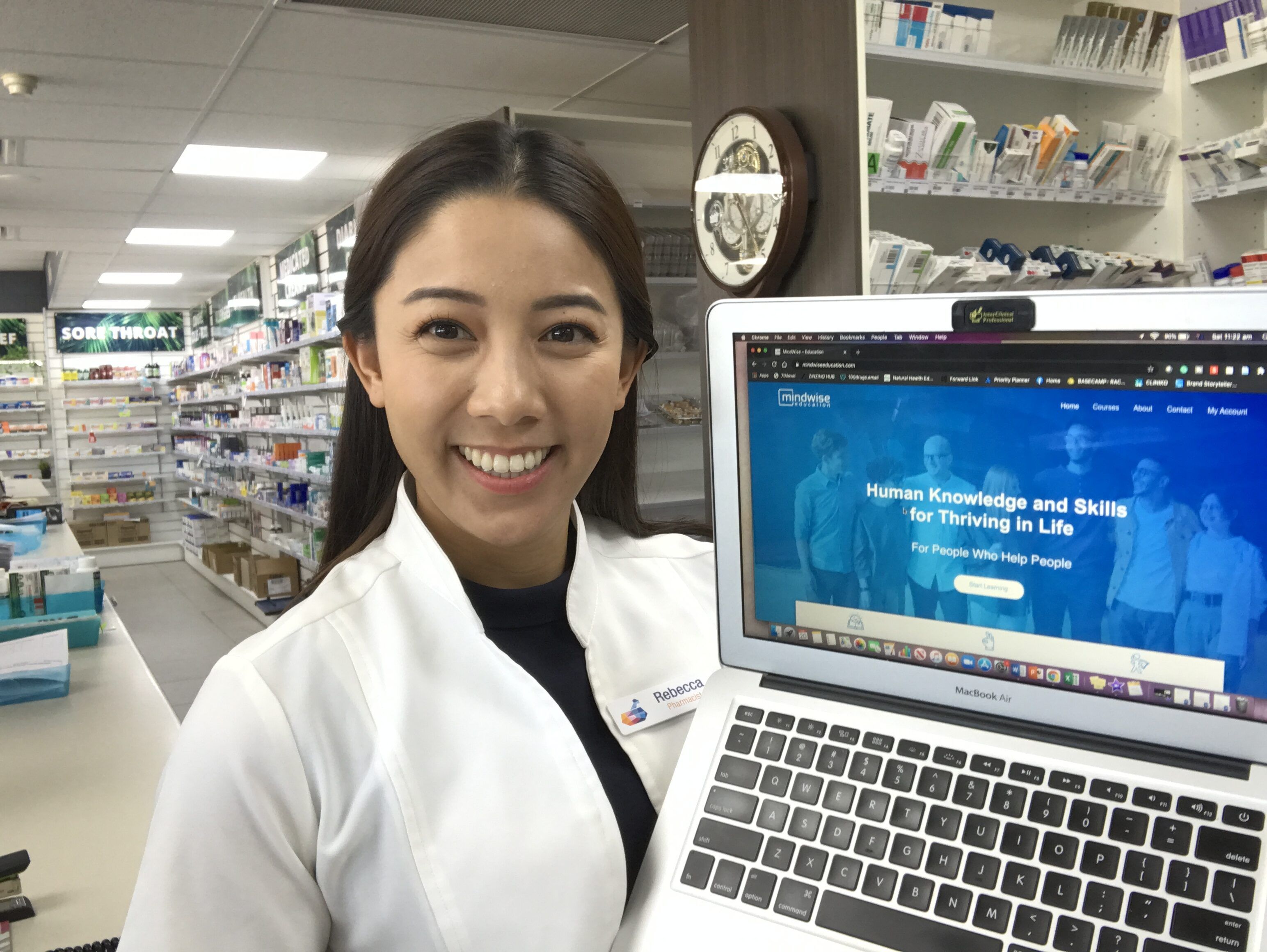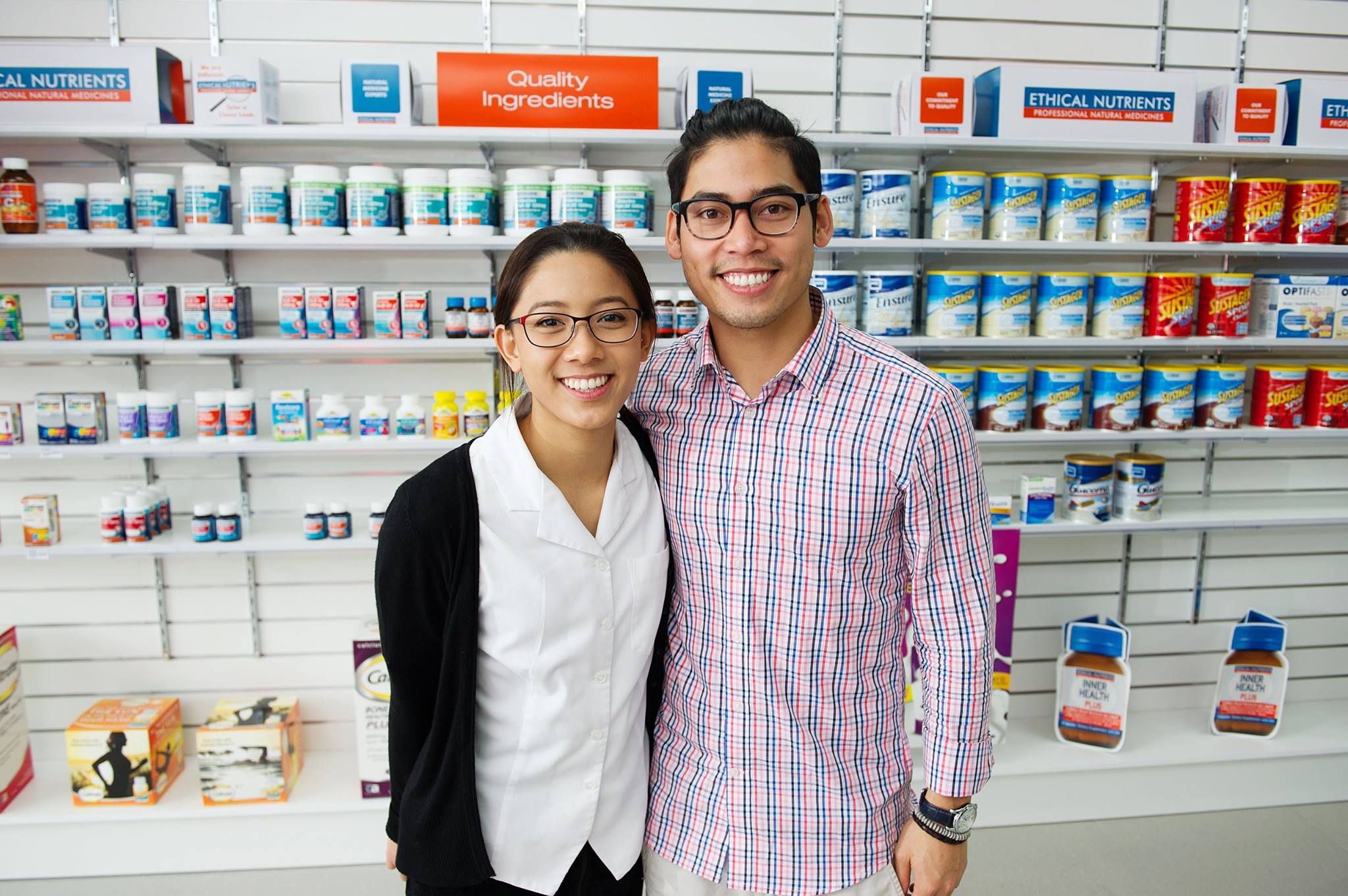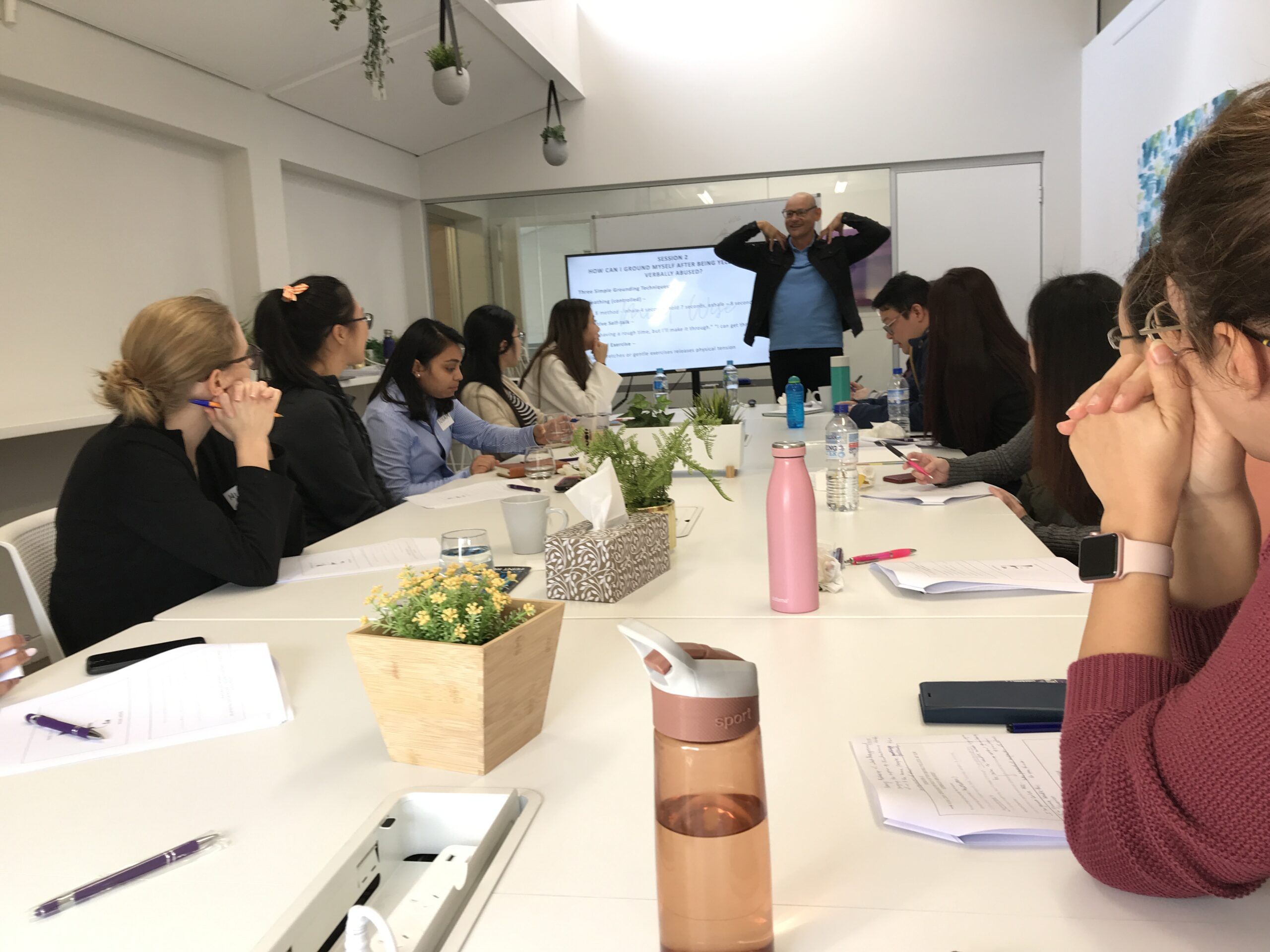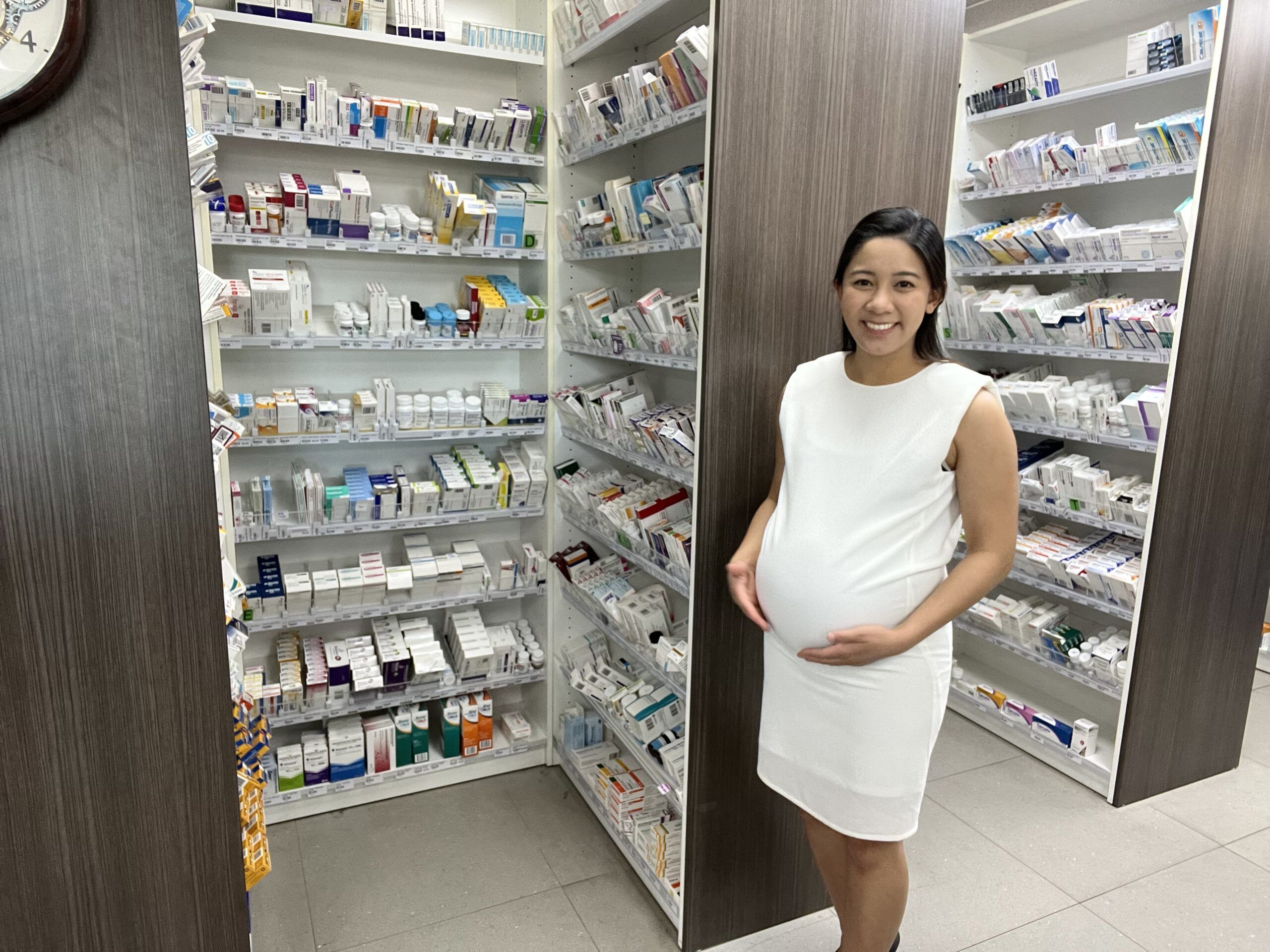Pharmacist and MindWise Education founder Rebecca Chan
Aurthor | Carmelle Wilkinson
Working on the frontline can often be an unforgiving and challenging role as Pharmacist Rebecca Chan (Pharmacy graduate, 2013) knows all too well.
While others bunkered down for another snap lockdown, Rebecca was behind the dispensary counter at her family run pharmacy in Canning Vale – ready to serve on WA’s frontline.
As one of the first points of contact for people seeking health advice, Rebecca said pharmacists working in the current Covid-19 environment had overcome several challenges, including increased levels of fear and anxiety and growing abuse from customers.
Exacerbated by supply shortages and low stocks, pharmacists find themselves bearing the brunt of customers frustrations with many like Rebecca, reaching breaking point.
Teaming up with counsellor, educator and social worker Duncan Phillips, Rebecca launched MindWise Education, a series of online counselling educational videos aimed at helping pharmacists, students and health care workers diffuse difficult situations and combat fear in the workplace.
Her online videos which have generated nation-wide attention and earned her a Pharmaceutical Society of WA award for Innovation, also help people equip themselves so they can thrive professionally and personally amid the uncertainty of a global pandemic.

Pharmacist Rebecca Chan is the founder of Mindwise Education, an online counselling tool for health care workers and students.
Hi Rebecca, can you please tell me about your journey into Pharmacy? Were you always interested in pursuing a career in health care?
For me, I’ve always wanted to help people and I’ve always admired people who devote their lives to helping people. So, it’s no surprise pharmacy appealed to me. Now more than ever, I can see the tremendous need for pharmacists and good health care and I’m proud to be a part of that.
Shortly after graduating from Curtin with a Bachelor Degree in Pharmacy (2013) my brother and I opened our own Pharmacy in Canning Vale (2015).
My parents were young refugees from Vietnam who migrated to Australia in 1983 and 1984, so my brother and I are first generation Australians.
They run a Japanese Shushi store in Canning Vale, and I would work there on weekends during my time at university. After my brother and I had both graduated and were early career pharmacists the property manager offered my parents a larger space to relocate their Shushi store to.
Instead of moving their business, my mother had the initiative to ask if her family could start a pharmacy and that’s where is all began.
As a community pharmacist, you get a front-row seat to people’s journey in life, including the health battles and victories. It’s a humbling and challenging experience, but also incredibly rewarding.

Rebecca Chan and her brother John Nguyen at their family’s pharmacy in Canning Vale.
The pandemic has brought with it and myriad of challenges on many levels. As a frontline worker have you experienced heightened levels of fear and anxiety in the community?
Yes. Absolutely.
Working in any human services environment isn’t always easy, and this is especially true during a pandemic. The ever-changing climate throws much uncertainty in the air and for many people this causes them a great deal of stress, fear and anxiety.
Unfortunately, this transpires into anger and frustration, particularly when customers come into the pharmacy and can’t find what they’re looking for – whether it be masks, hand sanitiser or their usual medication.
This can all fuel one’s emotions and cause them to lash out or act out of character.
With emotions running high, have you personally experienced any unpleasant interactions with customers?
Yes, unfortunately at the height of the pandemic in 2020 this was becoming all too regular.
We were seeing new patients from far away suburbs rushing around going into pharmacies searching for supplies. There was a lot of anxiety and aggression in the community.
Our pharmacy, like many others, faced unprecedented harassment and verbal abuse which left the team feeling vulnerable and burnt out.
I was almost at a point where it was too dangerous mentally and physically to work in pharmacy, and I wanted to put my hands up and say I quit.
Fortunately, and unfortunately for me, I help run my family’s pharmacy, so quitting wasn’t an option, so I needed to find a solution for the high attrition rate of pharmacists, the burnout and workplace burden on pharmacists.
I had to remind myself my goal was to treat everyone with dignity, no matter how they treat me, but I knew I needed very clear boundaries and responses for abuse towards our team.
“That’s when I had the idea to start MindWise Education – a series of educational counselling videos designed to help fellow pharmacists and health care workers navigate the changing environment, manage stress and deal with difficult situations.”
Why was it so vital to provide this educational tool for fellow pharmacists, health care workers and students? And why now?
I think now more than ever our frontline workers need our help.
Sadly, many health care workers neglect their own health in looking after others, so these videos were particularly important to ensure our pharmacists look after their mental health and well-being, so they are able to continue serving the community.
If we as an industry don’t provide support and education for our workforce and future frontline teams who will?
I teamed up with a group of professionals in counselling and communications and created MindWise Education, a series of online courses to help people adapt to the rapidly changing environment.
What started as a workshop in Perth with fellow start-up partner Duncan Phillips (counsellor, educator and social worker) to assist local pharmacists, quickly became an online educational tool for pharmacists not just here in WA but from around Australia.

Duncan Phillips (counsellor, educator and social worker) running a MindWise Education workshop for health care workers.
Can you please tell me more about MindWise Education and what pharmacists and participants might gain from taking part in the online courses?
The focus of the courses is to better equip people to set boundaries and work from a place of purpose and compassion, for both themselves and their patients.
We examine and identify the many challenges a pharmacist may currently be experiencing and provide useful strategies and tools to minimise and cope with the stress in the workforce.
“Although known for their resilience, pharmacists and other health care workers often don’t think about their health as a priority, so these videos are a reminder that they need to take stock, take a break and address the challenges they are facing.”
The counselling courses also help people learn how to diffuse critical situations and abusive customers.
It’s been wonderful to see pharmacists working together to improve the delivery of their services and their relationship with their customers.
How has the industry changed or been affected since Covid-19? What have been some industry challenges?
In March 2020, the early stage of the pandemic saw an increase in anxiety, uncertainty and fear in the community. Pharmacists stood on the front line, being the only health profession that does not require appointments and the industry had to overcome several challenges. One major challenge was handling the heavy demand for health care by the community and reducing burnout in the industry.
The current pandemic has also broadened the scope of pharmacy, which is quite exciting. We are now seeing vaccination clinics and pharmacies building more consultation rooms to discuss diabetes treatment, medication reviews and specialised health services in rehabilitation and pain management.
We are still working with many pharmacists and talking to industry leaders to see how we can best equip and support our pharmacists as we evolve through the pandemic.

Rebecca Chan is week’s away from her maternity leave.
Have you experienced panic buying of late? What is the current status on stock and supply?
The current state in WA is lack of supply of N95 masks, Rapid Antigen Tests, medical devices such as oximeters, thermometers and basic over the counter medications like paracetamol.
Unlike March 2020, people are more use to stock being sold out and understand that we are waiting for both manufacturers and wholesalers to supply the community.
We are more fortunate in WA that we are not like other cities and countries right now. However, I’m sure every pharmacy is working all their resources and processes to ensure they have an efficient and fair supply of necessary health care goods for their local community.
Would you encourage someone to pursue a career in pharmacy? And what does the future hold for you?
Absolutely. Looking back on my studies at Curtin I can honestly say it was one of the fondest times in my life. The memories from the friendships made and the version of yourself you get to develop as a student and young adult is priceless.
I am going on maternity leave in a weeks’ time, so I acknowledge my team and other healthcare workers who remain on the frontline.
I think it’s most courageous when caring for customers that you keep your heart open and treat everyone with respect, dignity and care.
This goes for leaders who manage their team members, team members who support each other and for anyone with any authority in the health care sector to have a positive influence on their patients, who are most vulnerable.
You don’t seek for health advice/ services when you’re not vulnerable.
Aurthor | Carmelle Wilkinson
___



